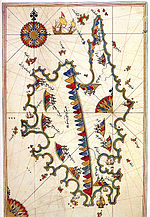Arzachena culture
| History of Corsica |
|---|
 |
|
|
 |
| History of Sardinia |

The Arzachena culture was a late Neolithic pre-Nuragic culture occupying the northeastern part of Sardinia (Gallura) and part of southern Corsica from roughly the 4th to the 3rd millennium BC.[1] It takes its name from the Sardinian town of Arzachena.
The Arzachena culture is best known for its megalithic structures, suchs as the characteristic "circular graves" and menhir.[2][3] Both the funerary architecture and the material culture show similarities with contemporary contexts of Catalonia, Languedoc, Provence and Corsica.[4]
Differently from the people of the contemporary Ozieri culture of the rest of Sardinia, the people of the Arzachena culture were organized in an aristocratic and individualistic society focused on pastoralism rather than farming agriculture.[5] The aristocratic groups buried their dead in megalithic monuments in the shape of a circle, with a central chamber containing a single individual,[6] while on the rest of the island the Ozieri people buried their dead in collective hypogeum tombs called Domus de Janas.[5]
See also
Notes
- ^ Angela Antona, Il complesso nuragico di Su Brandali e i monumenti archeologici di Santa Teresa di Gallura, p. 13: Il sincronismo culturale e cronologico del megalitismo in Gallura e Corsica fa ipotizzare, con sufficienti margini di certezza, che proprio il braccio di mare delle Bocche di Bonifacio possa aver rappresentato un trait d’union fra le due isole, nell’ambito di attività di scambio delle quali il territorio teresino doveva essere attivamente partecipe.(in Italian)
- ^ Giacomo Paglietti All’origine del megalitismo nell’occidente mediterraneo: le tombe a circolo(in Italian)
- ^ Giovanni Ugas, L'alba dei Nuraghi (2005) p.14
- ^ Paola Mancini, Gallura preistorica, 2011 p.17
- ^ a b Giovanni Lilliu, La società in Sardegna nei secoli, Prima dei nuraghi, p.13
- ^ Giovanni Lilliu, La società in Sardegna nei secoli, Prima dei nuraghi, p. 11
Bibliography
- AA.VV. La civiltà in Sardegna nei secoli - Torino - Edizioni ERI.
